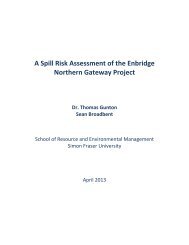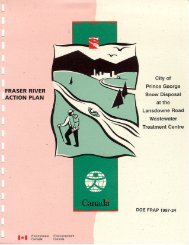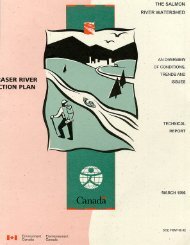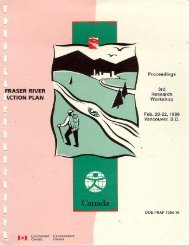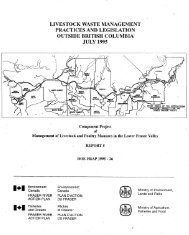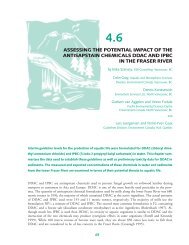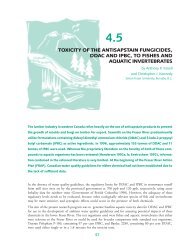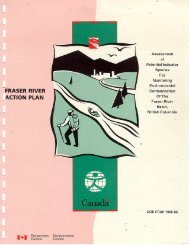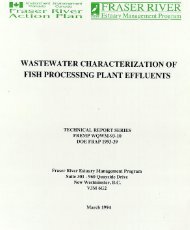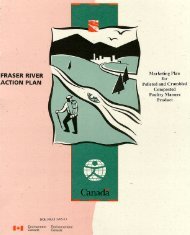9420.pdf
9420.pdf
9420.pdf
Create successful ePaper yourself
Turn your PDF publications into a flip-book with our unique Google optimized e-Paper software.
5.3.4.3 Enhanced Gravity Settling<br />
To the knowledge of the authors no full scale installations of this type exist in fish<br />
processing plants.<br />
The recently developed process of enhanced gravity settling (Microsep) is described by<br />
its manufacturer (International Water Solutions Corporation) as a combination of a<br />
chemical reactor and a clarifier within a single plant. It generally requires pH adjustment<br />
of the wastewater prior to addition of an inert particulate carrier (l PC) and flocculent. The<br />
IPC, flocculent, and contaminants (solids, and O&G) form particles of sufficient weight to<br />
settle rapidly, thus requiring substantially smaller equipment compared to conventional<br />
clarification. The settled sludge is withdrawn from the clarifier and passed through a<br />
separation device to remove the IPC for reuse in the process, while the removed<br />
contaminants may be further dewatered. The type of IPC used depends on the particular<br />
application.<br />
The Microsep process has already been used successfully in wastewater treatment<br />
applications in a wide variety of industries. Recent preliminary testing of the bench scale<br />
Microsep process for TSS and COD removal from hold water of fishing boats showed<br />
promising results. With coagulant addition, TSS and COD removal efficiencies were<br />
95-99 %, and 81-91 %, respectively (pers. comm. with Mr. Rob Dash and Mr. Ken<br />
Peon of International Water Solutions Corporation, 1993). Microsep generally achieves<br />
sludges with 2-7 % solids concentrations without additional dewatering.<br />
5.3.5<br />
Biological Treatment<br />
Most seafood processing plants in BC are relatively small and are located along coastal<br />
areas where land is expensive and space limited (i.e. Lower Mainland, Vancouver Island,<br />
and Prince Rupert area). Land considerations alone can be an inhibitive factor in applying<br />
biological methods for pollution abatement in coastal zones (Chao et al., 1980). Further,<br />
most seafood processing operations are seasonal as they are dependent on the seafood<br />
catch. Another factor that may affect biological treatment is the low temperature of the<br />
wastewater which slows down biological activity. Wastewater temperature is a function<br />
of temperature of water used in the process, mixing of wastewater stream with water from<br />
ice melting, and inclusion of cooling water into the waste stream. Wastewater<br />
temperatures at B.C. fish processors could be as low as 40 C in winter (NovaTec pers.<br />
67



